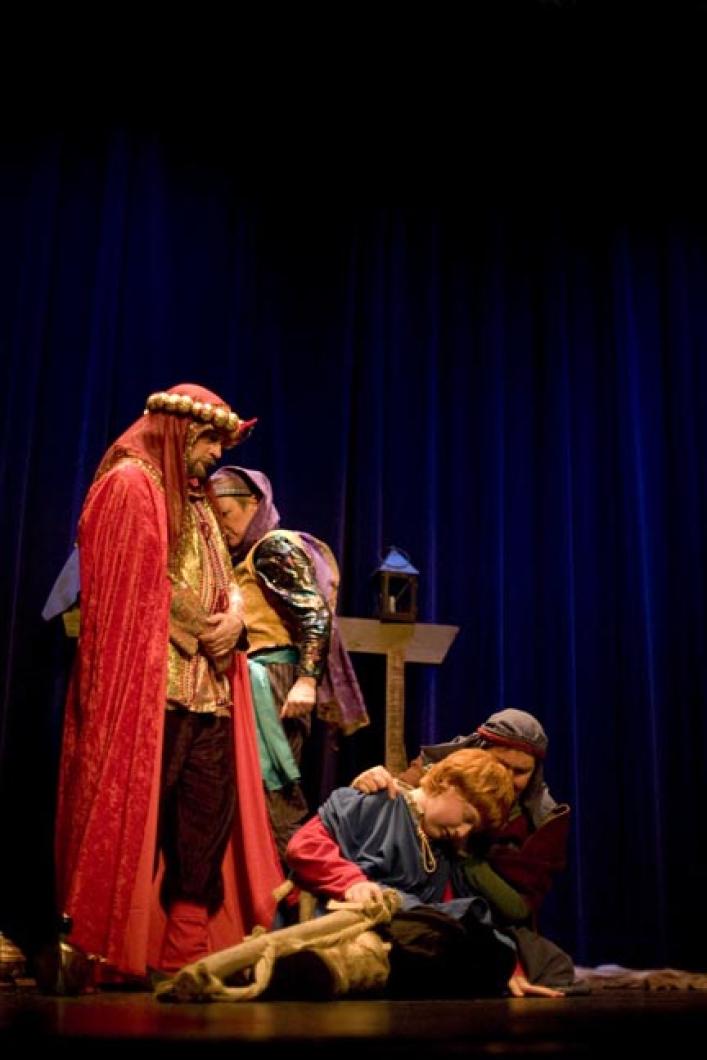The good thing about January is that it isn’t December. December, of course, is when we spend too much money on presents, stress out that we’re compelled to send cards and letters, attend parties and fundraisers, and string up tired decorations. Or we’re feeling guilty that we’re not doing any of those things. But on occasions during each Christmas season, we’re bound to partake of an event that makes it all worth while. A performance of Amahl and the Night Visitors is one of those occasions. Thanks to Island Theatre Workshop at the Katharine Cornell Theatre last weekend (and this), we have a chance to indulge in that particular pleasure even as Christmas madness has gone.
The action of the mini opera takes place in the first century, in the neighborhood of Bethlehem (it occurred to this reviewer that the three kings speak as if they’ve got a long way to go to find the manger, and no one bothers to tell them, “You’re almost there, guys.”)
Our two main protagonists are the lame (as in needs-to-walk-with-a-crutch) pre-teen, Amahl (played by Eli Dagostino), and his mother (Annie Palches). They’ve recently lost Amahl’s father, a shepherd, necessitating the sale of their herd of sheep and anything else that isn’t nailed down. Next step: begging from door to door. Oy.
Amahl is given to telling tall tales, so his mother is loathe to believe him when he reports seeing a star “big as a window.” When the three kings appear on the mother and son’s doorstep — first one, then two, then all three — Amahl knows it’s going to be a hard sell with his mother. Some excellent physical comedy is mined from this situation as Amahl slams the door on all three.
Director Lee Fierro has long desired to stage Amahl and the Night Visitors, but has waited for years to find a boy soprano. Her dream was answered in Mr. Dagostino, seventh grader at the West Tisbury School. The 55-minute opera is, of course, entirely sung, even the “Answer the door” lines, and Eli, with his mop of strawberry blond hair, is fully up to the challenge.
The three kings, played by Brad Austin, Kevin Ryan and Elza Minor, make a dramatic entrance: in theatrical darkness they enter singing from the rear of the house, their “sherpa” (Jane Lawson) shedding a pale light from a lantern. As the men reach the soft stage lights, their costumes stun mother, son and audience: luxurious insets of brocades and velvets, cross-stitched with strands of gold: kudos to costumer Michele Jones.
Mr. Ryan had the best comedy material for his king, who is hard of hearing, travels with a caged parrot, and goes nowhere without his box of three drawers. The first drawer contains magic stones — always handy — the second with strands of beads, and the third, clearly his favorite and, in telling Amahl he pauses with the dramatic effect of a drum roll . . . licorice! It’s the kind of goofy moment that relieves the weight of profundity from the tale. In the poignant words of the opera, the kings tell Amahl’s mother what they’re seeking: “A child the color of wheat, the color of gold. His eyes are sad, his hands are those of the poor, as poor he was born.”
Naturally, Amahl’s mother believes in her own son’s preciousness as much as the Magi believe in the divine child’s. She repeats the words about wheat, gold, sad eyes and poor hands with a longing that is heart-rending.
And then the shepherds arrives — Eleanor Beth, Margaret Chirgwin, Belle Dinning, Lee Fierro, Haley Hewson, John Hickey, Janet Holladay, Michele Jones, Elizabeth Kehoe, Howie Marlin, Leila McCarter, Jeanne Moore, May Oskan, Jim Osborn and Susan Phelps. They pay homage with food of their own harvesting: citrons, lemons, walnuts and honeycombs. The kings receive the tribute graciously, and then three of the villagers dance for them (Miss Dinning, Ms. Holladay and Ms. Oskan; youngster Belle is particularly appealing as the un-shy girl performer.)
Later that night, while the monarchs sleep, Amahl’s mother, in a weak moment, asks the age-old question, “Do rich people know what to do with all their gold?” Although the age-old answer is “Most of them don’t,” we still shudder for her when she violates the code of hospitality and, to ensure Amahl’s welfare, steals several gold pieces.
She’s caught in the act, Amahl defends her, the kings are forgiving, and Amahl offers his crutch to the Magi for the divine child, should he require it. Suddenly a miracle descends on Bethlehem, and the shepherd boy can walk.
Music director Peter Boak performed on keyboard, and Wesley Brown presided at the theatre’s baby grand piano. Brad Austin provided set design, the stage manager was Betsy Hauck, and lighting was by Nancy Pedulla.
Amahl is on tonight, Saturday and Sunday.






Comments
Comment policy »